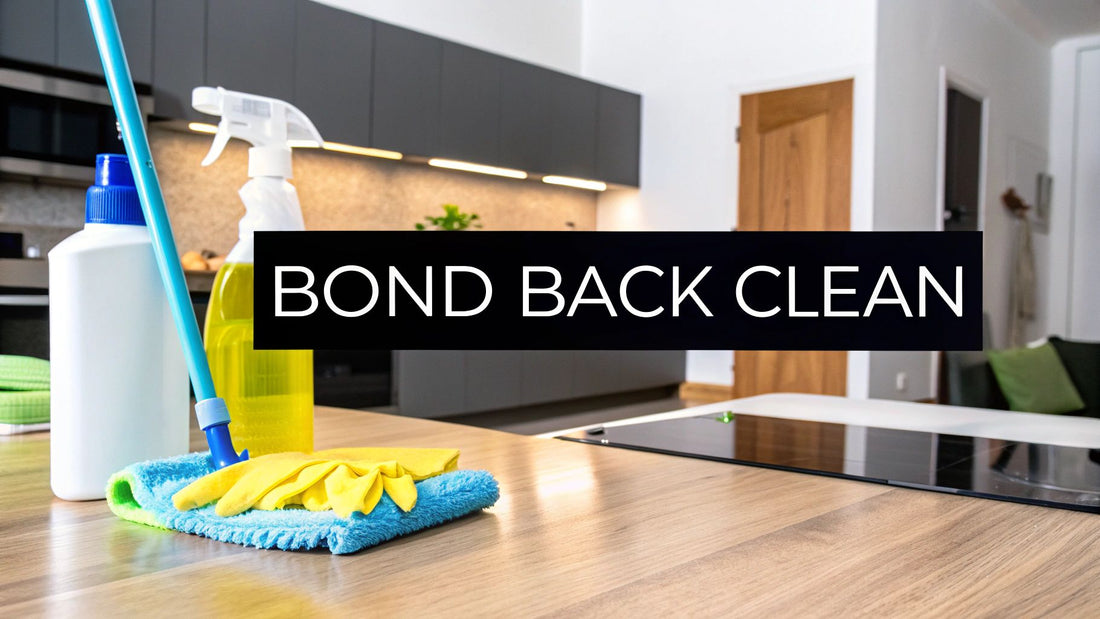Moving out is stressful enough without losing your security deposit over cleaning issues. Thankfully, that's completely avoidable. An end of lease cleaning isn't just a quick tidy-up; it's a deep, wall-to-wall clean designed to get your rental property back to the exact condition it was in when you first moved in. It's way more detailed than your weekly wipe-down and is absolutely critical for getting your full bond back.
Your End of Lease Cleaning Game Plan
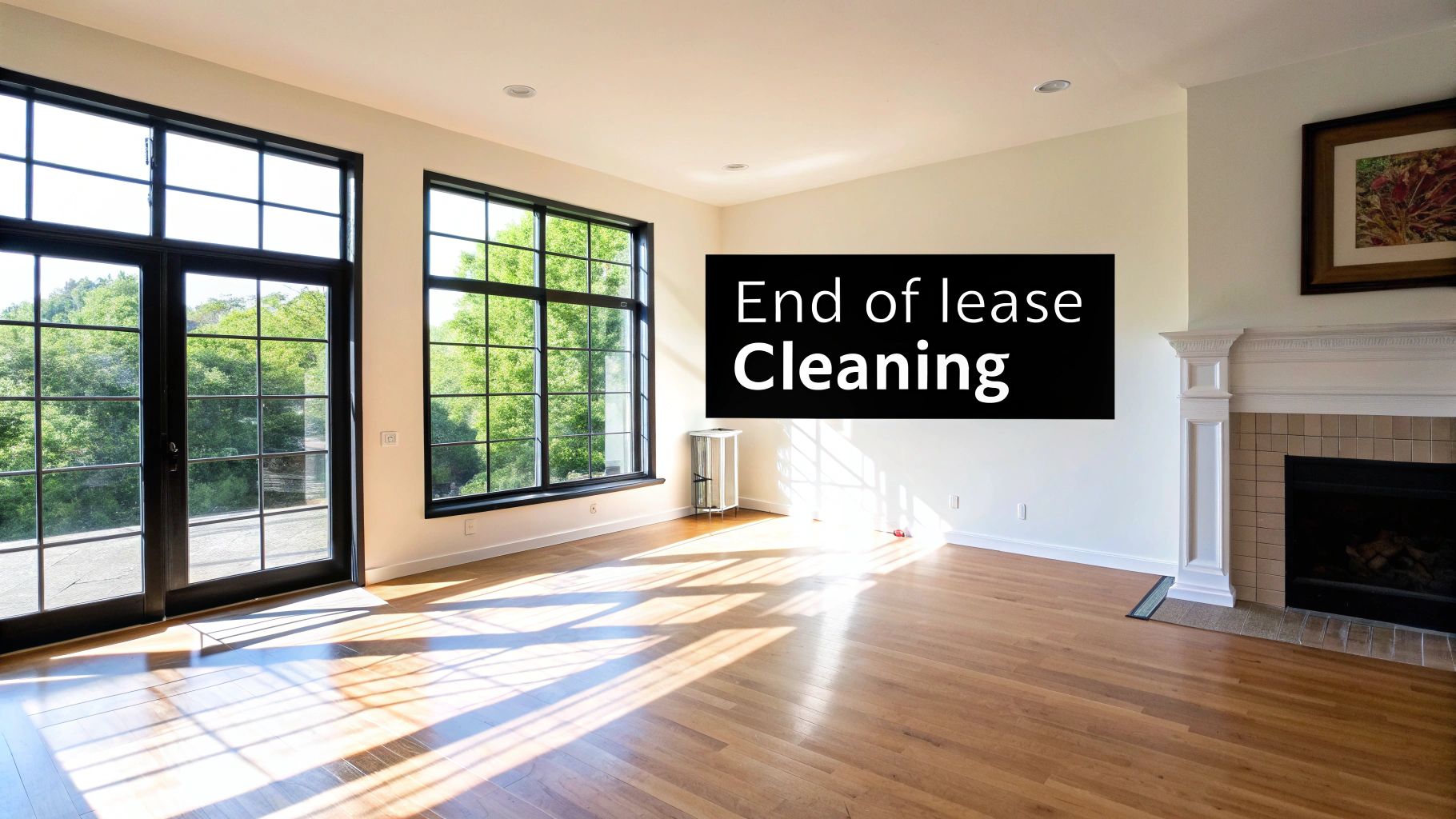
Tackling a move-out clean requires a solid strategy. If you just start scrubbing without a plan, you're bound to miss spots and create a ton of last-minute stress right before that final inspection. The goal here isn't just to make the place look clean; it's about meeting the strict standards of property managers who know exactly where to hunt for leftover grime. This means you have to get past a simple surface-level clean and really focus on restoring the property.
This guide is your roadmap to securing that full security deposit. We'll break down what landlords and property managers actually look for, so you can focus your energy where it counts the most.
Why a Plan Is Non-Negotiable
A move-out clean is a huge project that needs to be organized. Putting together a realistic timeline and gathering the right supplies before you start are the first steps to success. Trust me, the job is always bigger than you think, which is why having a structured approach makes all the difference.
The real difference between a regular clean and a successful end of lease clean is the attention to detail. Property managers will be inspecting places you probably ignore in your day-to-day life—like the inside of cabinets, behind the fridge, and all along the baseboards.
This methodical approach is becoming even more important as the rental market grows. The global end of lease cleaning industry hit a value of about USD 5.2 billion in 2024 and is expected to keep climbing, which just shows how many people are moving in and out of rentals.
As you plan your move, using a comprehensive moving checklist can be a lifesaver, ensuring no small detail gets overlooked. By preparing properly, you can turn a daunting task into a manageable one, setting yourself up for a smooth handover and a full bond refund.
Mastering the Kitchen and Bathroom Clean
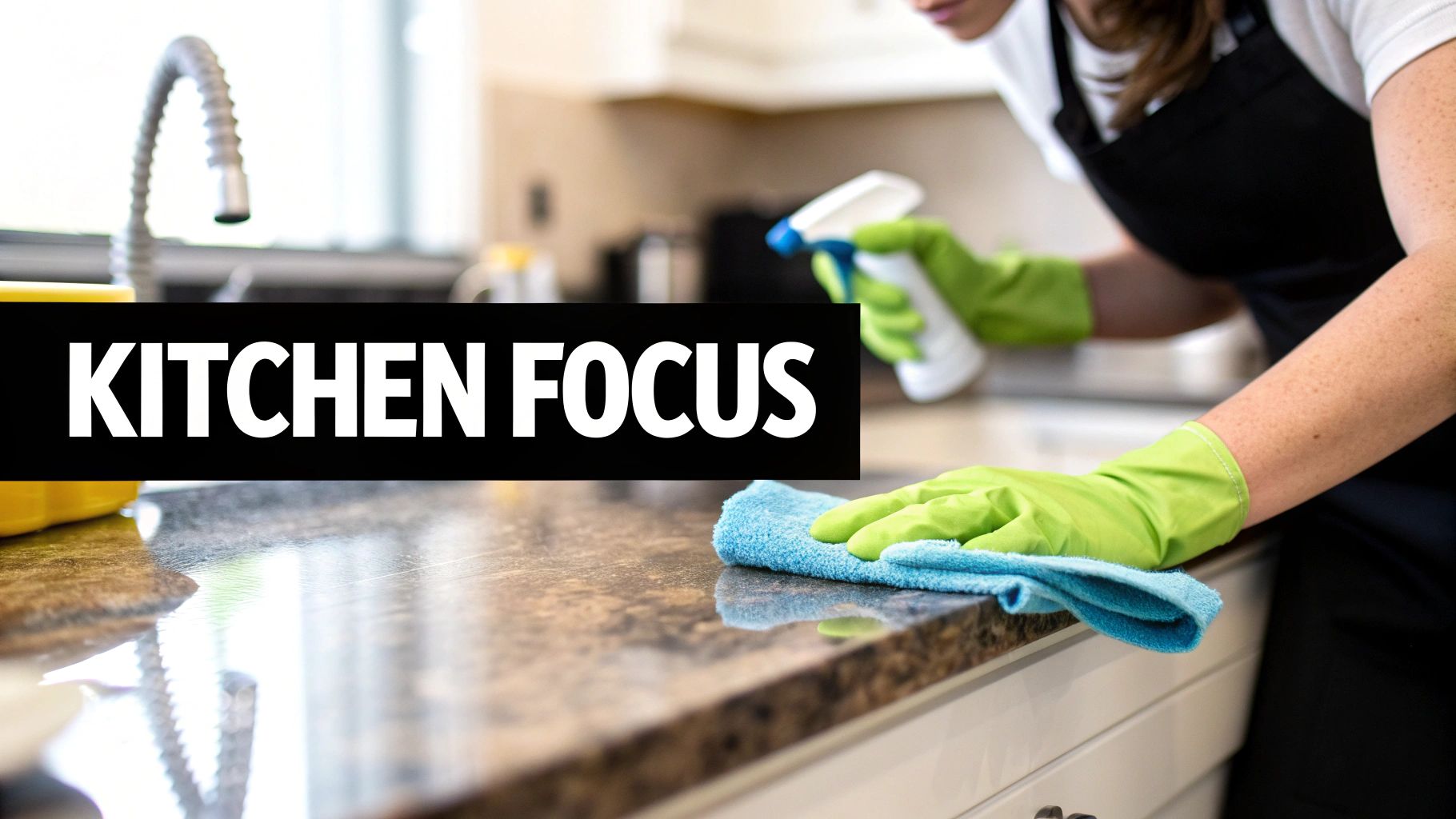
Let's be honest: the kitchen and bathroom are where property managers put on their white gloves. These two rooms get the most use, show grime the fastest, and are the number one reason tenants lose a chunk of their bond. A quick wipe-down just isn't going to cut it here—you need to think more like a crime scene investigator.
This is a level of cleaning that goes way beyond your typical weekly tidy. You're aiming for a professional-grade result, which is no small feat in an industry that generated about USD 416 billion in 2024. To see just how different this is, check out our guide on the differences between a deep clean vs a standard clean: https://custom-maids.co/blogs/news/deep-clean-vs-standard-clean.
The Kitchen Deep Clean Checklist
Your kitchen has seen a lot of action, from splattering sauces to grease buildup. To get it back to move-in condition, you have to work methodically from the top down.
Start with the spots everyone forgets but inspectors always check. We're talking about wiping the tops of your cabinets, cleaning the range hood filter (many can be soaked in degreaser or even run through a dishwasher), and scrubbing the exhaust fan cover until it’s spotless.
Next, empty every single cabinet and drawer. Wipe them down completely, getting rid of any lingering crumbs or sticky spots. From there, focus on the big-ticket items:
- The Oven: This is absolutely non-negotiable. Grab a heavy-duty oven cleaner and get to work on the interior, the racks, the grill, and the glass door.
- The Cooktop: Scrape off any burnt-on food with a non-abrasive scourer. Make sure you use a cleaner designed for your specific type of cooktop.
- The Sink and Taps: Descale the faucet to remove any hard water buildup and polish it until it gleams. Don't forget to clear the drain of all food debris.
Tackling Bathroom Grime
Bathrooms are a magnet for soap scum, mildew, and water stains—all major red flags for a property manager. The goal is to make every single surface shine like new.
The shower is usually the biggest challenge. A specialized cleaner will be your best friend for tackling soap scum on glass screens and tiles. And here's a pro tip: an old toothbrush is perfect for getting into grout lines and around fixtures to scrub away any hint of mold.
A common mistake is using the wrong product on bathroom fixtures, which can cause permanent damage. Always test cleaners on a small, hidden spot first, especially if you have chrome or specialty finishes.
Finally, give the vanity, sink, and toilet a thorough cleaning and disinfecting. Polish the mirror until it's perfectly streak-free, clean out the exhaust fan, and remember to wipe down the inside of any cabinets or drawers. This kind of attention to detail during your end of lease cleaning is what makes all the difference in that final walkthrough.
The kitchen and bathroom are truly where bonds are won or lost. These areas have hidden spots and tough grime that are easy to overlook but are the first things an inspector will notice.
Kitchen and Bathroom High-Priority Cleaning Tasks
To help you focus your efforts, here’s a breakdown of the most critical tasks that tenants often miss, leading to deductions.
| Area | Task | Why It Matters for Your Bond |
|---|---|---|
| Kitchen | Cleaning the Oven Interior | A greasy oven is a huge red flag for neglect. Inspectors check inside and out. |
| Kitchen | Degreasing the Range Hood Filter | A clogged filter shows a lack of deep cleaning and can even be a fire hazard. |
| Kitchen | Wiping Inside Cabinets/Drawers | Crumbs and residue suggest the property wasn't fully emptied and cleaned. |
| Bathroom | Scrubbing Grout for Mold/Mildew | Any sign of mold can lead to significant deductions for remediation. |
| Bathroom | Descaling Taps and Showerhead | Hard water buildup makes fixtures look old and poorly maintained. |
| Bathroom | Cleaning the Exhaust Fan Cover | Dust and grime here indicate poor ventilation and a lack of thorough cleaning. |
Paying extra attention to these specific tasks significantly increases your chances of getting your full bond back. It’s the little details that show you’ve taken care of the property.
Getting Living Areas and Bedrooms Inspection Ready
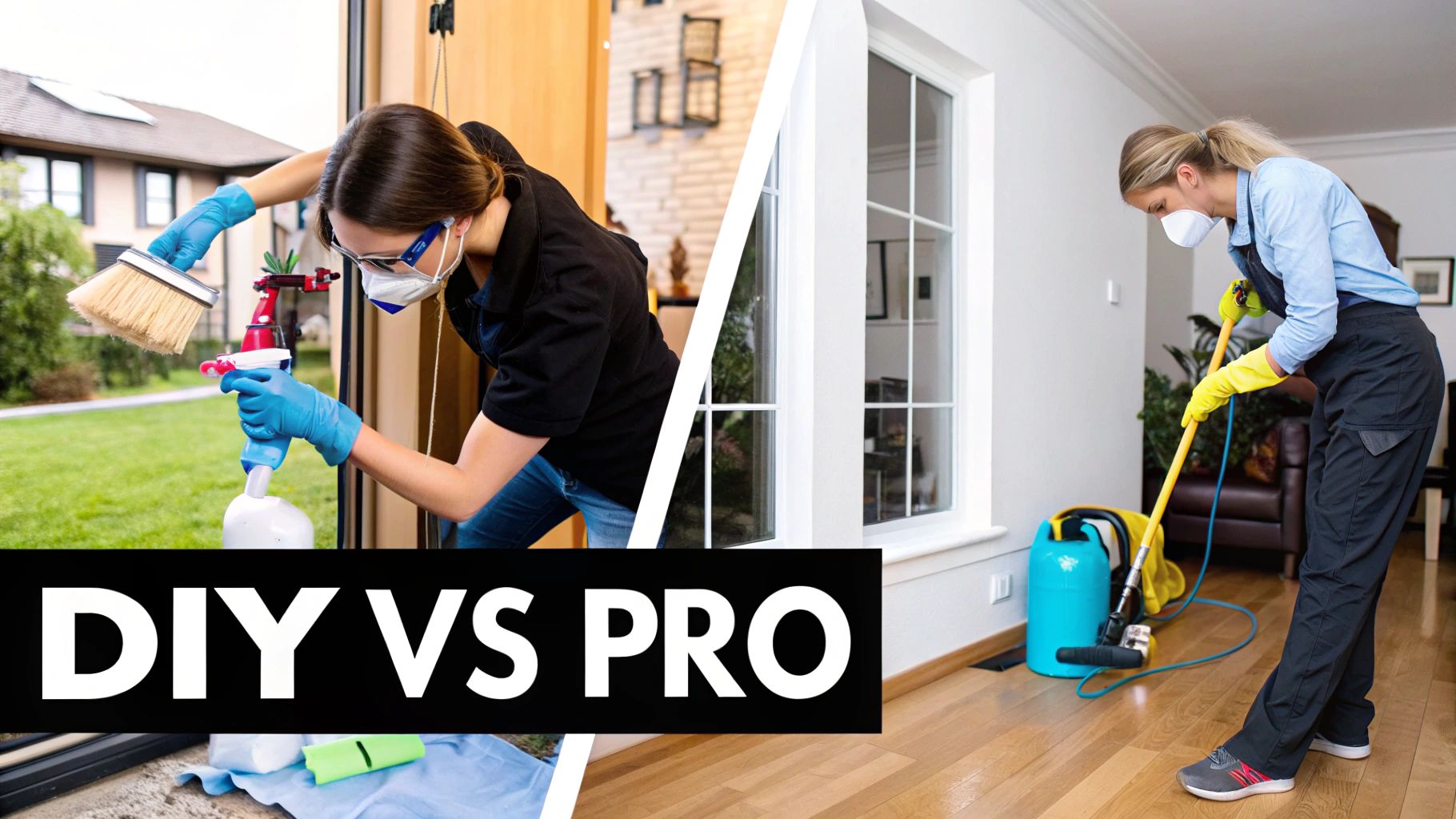
Now that the kitchen and bathroom are sparkling, it's time to tackle the spaces where you spent most of your time. Living rooms and bedrooms can seem deceptively simple, but they're filled with small details that property managers always check. This is about more than just a quick vacuum and dust—it's about restoring these rooms to move-in condition.
I always recommend working from the top down. Start with ceiling fans and light fixtures, which are notorious dust magnets. Next, move on to the windows. Don't just clean the glass; wipe down the sills and get into the tracks, where a surprising amount of dirt and dead bugs accumulate.
Walls, Wardrobes, and Final Details
The walls are one of the first things an inspector will notice. You can handle most scuffs and fingerprints with a magic eraser or a soft cloth dipped in a mild cleaning solution. Just be sure to test it on a hidden spot first to make sure it doesn't damage the paint. After that, wipe down all the baseboards, light switches, and power outlets.
And you can bet the inspector is going to open every single wardrobe and closet.
- Empty and Wipe: Make sure they're completely empty, then give all shelves, drawers, and hanging rods a thorough wipe-down.
- Mirrors and Doors: If you have mirrored doors, get them completely streak-free.
- Check the Floors: Don't forget to vacuum the corners and edges inside the closet.
To be absolutely certain you've covered all your bases, it's not a bad idea to think beyond just cleaning. Consulting a comprehensive pest control inspection checklist can help you spot any hidden issues that might cause problems.
Your rental agreement might specifically require professional carpet cleaning, especially if you had pets. Even if it doesn't, stained or worn-looking carpets are one of the biggest reasons landlords deduct from a bond.
Finally, the floors tie the whole room together. This means a thorough vacuum and mop, but for many, a professional carpet clean is a non-negotiable part of a successful end of lease cleaning. The carpet and upholstery cleaning market is a massive industry, projected to hit USD 67.4 billion by 2025, which just goes to show how important it is for property maintenance. This final touch leaves the entire space looking, feeling, and smelling fresh for inspection day.
Wrapping Up: Floors and Outdoor Spaces
Once the rest of the property is sparkling, the floors are the last major hurdle. They're what you clean right before you walk out that door for the last time, and a clean floor pulls the whole room together. How you tackle them depends entirely on the material, because the last thing you want is to cause damage.
For anything like hardwood or laminate, stick with a pH-neutral cleaner. It's the best way to avoid ugly streaks or, worse, stripping the finish. Tile floors, especially in kitchens and bathrooms, need a good mopping—and don't forget the grout lines. That’s where grime loves to settle in.
Why You'll Probably Need Professional Carpet Cleaners
Let's be honest: your vacuum cleaner probably isn't going to cut it for the final inspection. Most lease agreements flat-out require a professional steam cleaning, especially if you had pets. This isn't a suggestion; it's often a must-do for getting your full bond back during an end of lease cleaning.
When you're looking for a service, make sure they:
- Give you an itemized receipt you can show your property manager.
- Know the ins and outs of end-of-tenancy cleaning standards.
- Offer a bond-back guarantee on their work.
Pro Tip: Book the carpet cleaners for the very last slot. Schedule them after every single piece of furniture is out and all the other cleaning is done. This guarantees they're perfect for the final walkthrough.
Don't Overlook the Outside
Your job isn't done when you step outside. Property managers absolutely check balconies, patios, and garages. These areas are the first and last things they see, so they make a big impression.
Start by sweeping up any leaves, dirt, and cobwebs. A quick hose-down on a patio or balcony makes a world of difference. And pay close attention to the tracks on sliding glass doors—they're notorious for collecting gunk. An old toothbrush and some all-purpose cleaner will get them looking new again. Finally, if your car left any oil stains in the garage, a commercial degreaser can lift them right out, showing you took care of every inch of the property.
DIY Cleaning vs Hiring a Professional Service
One of the biggest decisions you'll make when moving out is whether to handle the end-of-lease clean yourself or call in the pros. It's tempting to think the DIY route will save you money, but the costs add up faster than you'd expect. Once you buy all the specialized cleaning supplies, rent a carpet steamer, and—most importantly—factor in your own time, it's rarely a cheap or quick job.
This isn't just a weekend tidy-up; it's a grueling, multi-day deep clean that has to meet a landlord's exacting standards.
A professional service, on the other hand, gives you a clear price upfront along with some major advantages. These teams show up with all the right industrial-grade gear and have a sixth sense for what property managers look for during that final inspection.
This chart breaks down the real differences in cost, time, and your chances of getting that bond back.
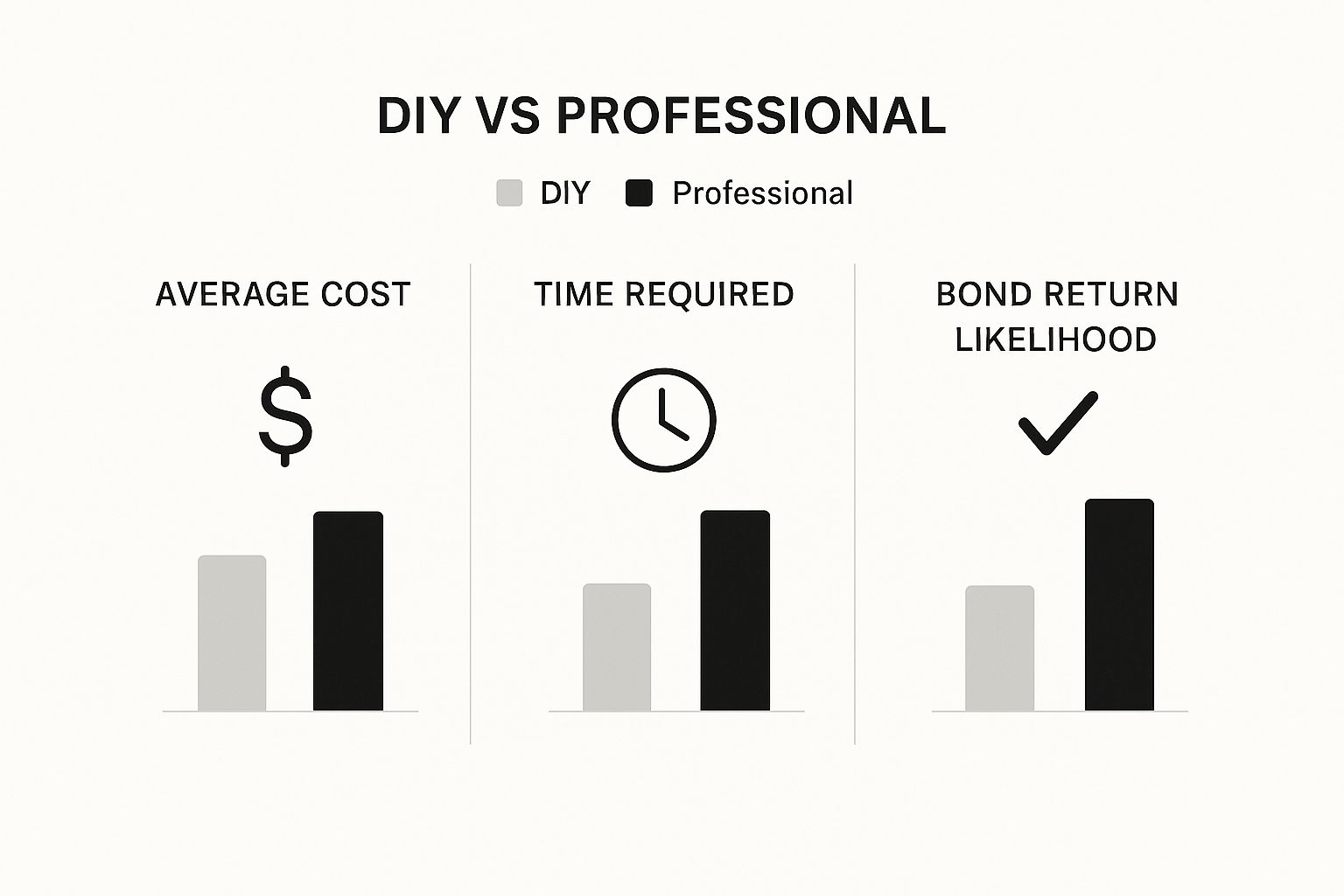
As you can see, while rolling up your sleeves is cheaper initially, hiring professionals dramatically increases your odds of a full bond return and saves you a ton of time and stress.
Making The Right Choice For You
So, which path is right for you? It really boils down to your budget, how much time you have, and your confidence in your own cleaning skills. If your schedule is wide open and you're prepared for some seriously meticulous work, going the DIY route is definitely possible.
But for most of us juggling packing, working, and the general chaos of moving, hiring a professional is a smart investment. It's not just about the cleaning; it's about buying back your time and sanity.
A crucial factor to consider is the direct comparison between doing it yourself and hiring out. Let's lay it out clearly.
DIY vs Professional End of Lease Cleaning
| Factor | DIY Cleaning | Professional Service |
|---|---|---|
| Cost | Lower upfront cost for supplies. Potential for hidden costs like equipment rental. | Higher initial cost, but it's a fixed price. No surprise expenses. |
| Time Investment | Extremely high. Can take multiple full days or even a week. | Minimal. Professionals can often complete the job in a single day. |
| Equipment | You'll need to buy or rent everything, from carpet cleaners to specialized solutions. | They bring their own industrial-grade equipment and supplies. |
| Bond Return | Success depends entirely on your thoroughness. Missed spots can lead to deductions. | Much higher likelihood of a full bond return. Many services offer a bond-back guarantee. |
| Stress Level | High. It's one more massive task on your moving to-do list. | Low. You can focus on packing and settling into your new place. |
| Expertise | You might not know all the specific requirements of a rental inspection. | They know exactly what landlords and property managers look for. |
Ultimately, the choice comes down to what you value more: saving a bit of cash upfront or saving yourself a massive amount of time, effort, and stress.
Many cleaning companies even offer a bond-back guarantee, which gives you incredible peace of mind knowing the job will be done right. If you're leaning toward getting expert help, checking out a dedicated move out cleaning service can take the guesswork out of the process and help secure your deposit.
Common Questions About End of Lease Cleaning
Even with a solid plan, a few last-minute questions always seem to pop up during an end-of-lease clean. Getting the right answers is the key to avoiding simple misunderstandings that could end up costing you a chunk of your bond. Let’s clear up some of the most common uncertainties tenants run into.
One of the biggest points of confusion is the phrase "reasonably clean." You'll see this in almost every lease agreement. It simply means you need to return the property to the same condition it was in when you moved in, accounting for normal, everyday wear and tear. It’s not about making the place brand new, but it does mean getting rid of all the dirt, grime, and stains that happened on your watch. Your best friend here is your original condition report and the photos you took on day one.
Navigating Lease Requirements
Another question we hear all the time is whether a landlord can make you hire a specific cleaning company. The short answer is usually no. While your lease might state that certain things, like carpets, must be cleaned to a "professional standard," you're typically free to choose your own qualified cleaner. Just make sure you get a detailed receipt to show your property manager as proof of the work done.
So, what are the top reasons people actually lose their bond money? The culprits are almost always the same:
- A greasy, uncleaned oven
- Stains on the carpets
- A grimy range hood and filter
- Soap scum buildup on shower screens
- Noticeable scuffs and marks on walls
These are all issues that a quick wipe-down just won't solve, which is why a detailed end of lease cleaning plan is so critical.
The final inspection is your last chance to prove you’ve met your obligations. The property must be completely empty and cleaned before you hand over the keys. This isn’t a dress rehearsal; it’s the final assessment.
The property has to be in its final, clean state when the landlord or agent does their walkthrough. For a deeper look at what they'll be checking for, our guide on creating a rental property inspection checklist is a fantastic resource to make sure you're fully prepared.
Feeling overwhelmed? The expert team at Custom Maids specializes in move-out cleans that meet the strictest standards, helping you secure your full bond refund without the stress. Learn more about our move-out cleaning services today!

